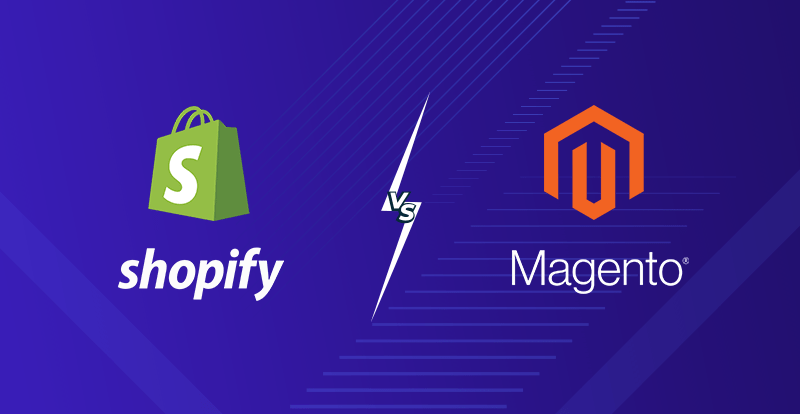Shopify vs Magento: Which to Choose in 2024?
The e-commerce landscape is constantly advance, with new technologies and platforms emerging to help businesses sell online more effectively. In 2024, Shopify and Magento remain two of the most accepted e-commerce platforms, each with its unique strengths and weaknesses. This comprehensive comparison will delve into various aspects of both platforms, helping you decide which is the best fit for your business.
Table of Contents
- Introduction
- Overview of Shopify and Magento
- Ease of Use
- Customization and Flexibility
- Performance and Scalability
- Security
- SEO Capabilities
- Pricing
- Customer Support
- Conclusion
1. Introduction
In today’s digital age, select the right e-commerce platform is deciding for the success of your online store. Shopify and Magento are two supreme players in this field, each offering unique features that provide to different business needs. This article provides an in-depth comparison of Shopify and Magento in 2024, focusing on their ease of use, customization, performance, security, SEO capabilities, pricing, and customer support.
2. Overview of Shopify and Magento
Shopify
Shopify is a cloud-based e-commerce platform known for its ease of use and quick setup. It offers a wide range of templates and tools designed to help businesses create and manage their online stores with minimal technical knowledge. Shopify is particularly popular among small to medium-sized businesses due to its user-friendly interface and comprehensive support system.
Magento
Magento, now part of Adobe Commerce, is an open-source platform that offers extensive customization and flexibility. It is a robust solution favored by larger businesses and enterprises that require complex and scalable e-commerce solutions. Magento’s powerful features and ability to handle high-volume transactions make it a preferred choice for businesses with extensive product catalogs and advanced e-commerce needs.
3. Ease of Use
Shopify
Shopify is renowned for its intuitive and user-friendly interface. The platform provides a straightforward setup process, with guided steps to help users get their stores up and running quickly. The drag-and-drop editor makes it easy to customize store layouts without any coding knowledge. Additionally, Shopify’s app store offers a vast selection of plugins and integrations that further simplify the management of various aspects of an online store.
Magento
Magento, being a more complex and powerful platform, has a steeper learning curve compared to Shopify. Setting up and managing a Magento store typically requires some technical expertise, especially for those looking to leverage its full potential. While Magento offers extensive documentation and a large community for support, new users might find it challenging to navigate the platform without prior experience or technical assistance.
4. Customization and Flexibility
Shopify
Shopify offers a range of customizable templates that can be tailored to fit your brand’s aesthetics. However, the level of customization is somewhat limited compared to Magento. While you can make basic changes to the design and functionality through the Shopify editor and apps, more advanced customizations might require access to Shopify’s Liquid programming language and API.
Magento
Magento excels in customization and flexibility, allowing businesses to create highly tailored e-commerce experiences. As an open-source platform, Magento provides complete access to the code, enabling developers to modify and extend the platform to meet specific business requirements. This level of control makes Magento ideal for businesses with unique needs or those looking to create a highly differentiated online store.
5. Performance and Scalability
Shopify
Shopify is a hosted solution, meaning that the platform takes care of all server maintenance and upgrades. This ensures that your store remains fast and reliable, even during peak traffic periods. Shopify also offers scalable plans that can grow with your business, making it a suitable choice for businesses of all sizes.
Magento
Magento is known for its robust performance and scalability, making it a preferred choice for large-scale e-commerce operations. The platform can handle thousands of products and high volumes of traffic without compromising performance. However, managing a Magento store requires proper server setup and maintenance, which can add to the complexity and cost.
6. Security
Shopify
Shopify takes security seriously, offering built-in SSL certificates and PCI compliance to ensure that customer data is protected. The platform also handles security updates and patches, reducing the risk of vulnerabilities. Shopify’s secure environment is a significant advantage for businesses that want to focus on selling rather than managing security.
Magento
Magento provides a secure platform, but security management is primarily the responsibility of the store owner. This means that businesses need to ensure their servers are secure and that they apply security patches and updates regularly. Magento offers various security features and extensions, but these need to be implemented and managed effectively to maintain a secure store.
7. SEO Capabilities
Shopify
Shopify offers solid SEO capabilities, with built-in features such as customizable title tags, meta descriptions, and URL handles. The platform also supports blogging, which is beneficial for content marketing and improving search engine rankings. However, some advanced SEO customizations might require additional apps or coding knowledge.
Magento
Magento is highly regarded for its SEO capabilities, providing extensive options for optimizing your store for search engines. The platform allows for advanced URL structures, metadata customization, and the ability to create SEO-friendly sitemaps. Magento’s flexibility enables businesses to implement comprehensive SEO strategies, making it a preferred choice for those with a strong focus on search engine visibility.
8. Pricing
Shopify
Shopify offers various pricing plans to accommodate different business sizes and needs. The basic plan starts at $29 per month, with advanced plans offering more features and scalability. While Shopify’s pricing is straightforward, additional costs can arise from using premium themes, apps, and transaction fees, depending on your payment gateway.
Magento
Magento’s pricing model is more complex. The open-source version of Magento is free to download and use, but businesses need to factor in the costs of hosting, security, and development. For larger enterprises, Magento offers a commerce edition with additional features and support, but this comes at a higher price point. The total cost of ownership for a Magento store can vary significantly based on the specific needs and resources of the business.
9. Customer Support
Shopify
Shopify provides 24/7 customer support through various channels, including live chat, email, and phone. The platform also has an extensive knowledge base, forums, and a wide range of tutorials and guides to help users troubleshoot issues and learn how to use the platform effectively.
Magento
Magento offers customer support through its community forums, extensive documentation, and a network of certified developers and partners. For users of the Magento Commerce edition, Adobe provides dedicated support services. However, for those using the open-source version, support is primarily community-driven, which can be less immediate compared to Shopify’s support options.
10. Conclusion
Shopify and Magento offer powerful e-commerce solutions, but they cater to different types of businesses. Shopify’s ease of use, reliable performance, and comprehensive support make it an excellent choice for small to medium-sized businesses and those looking for a hassle-free setup. On the other hand, Magento’s extensive customization options, scalability, and robust SEO capabilities make it ideal for larger businesses with complex needs and technical resources.
When choosing between Shopify and Magento, consider your business size, technical expertise, budget, and specific e-commerce requirements. By carefully evaluating these factors, you can select the platform that best aligns with your business goals and sets you up for success in the competitive world of online retail in 2024.
Related Blogs
Rising Significance of AI & ML in Full-Stack Development
Have you been part of the new evolving world of AI & ML in development? Well...
Web Design Trends to Watch in 2025
Innovation never takes a pause and stays one step ahead of you. As we are in the...
What Should You Choose? Dedicated Development Team or Freelance Developers?
Are you someone thinking about expanding your team? Are you someone juggling man...
Contact Us
Let’s Create Big Stories Together
We have stood the test of time, and built some of the finest mobile apps for over 100 clients around the world.
REQUEST A QUOTE-
UAE
FLRG - 05 GF, ibis World Trade Centre, Sheikh Zayed Rd, Trade Centre 2, Dubai - United Arab Emirates
Request a Quote
Please take a quick moment to complete this form and our business representative will get back to you swiftly.








